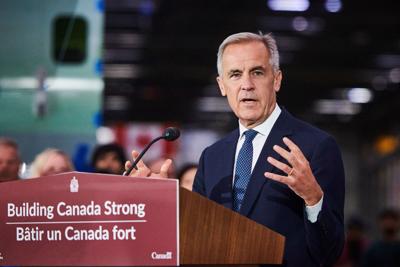With an ongoing trade war and jobless numbers rising, Prime Minister Mark Carney announced a host of economic measures Friday that are designed to boost and restructure the Canadian economy.
Training and jobs
Carney said Ottawa would spend $450 million on training programs to help re-skill 50,000 workers over the next three years. The money will go to existing Employment Insurance retraining programs and will include skills training, wage subsidies and career counselling.
New job numbers out Friday show the country’s unemployment rate has hit 7.1 per cent, the highest it has been since 2016, not including the pandemic years. Carney pledged $50 million to improve the government’s online job bank, and announced changes to Employment Insurance, giving long-tenured workers 20 extra weeks of EI payments to a total of 65 weeks. He is also extending two previous changes: one that allowed workers to receive severance payments and EI, and another waiving the one-week waiting period for benefits.
A strategic response
Carney announced a $5-billion fund to help businesses adapt to the new economic reality. The fund will focus on sectors that are particularly exposed to the trade war and need money to retool or find new customers.
“Businesses can use these funds to invest in the design of new products, to retool their plants to boost productivity or to offset the costs of accessing new markets,” he said.
The government is also offering a $382 million fund to help create “workforce alliances,” to bring together unions, employers and industry groups to deal with retraining needs and help recruit and retrain workers for new businesses.
Buy Canadian
Carney announced a “Buy Canadian” policy that will require federal government departments to buy from Canadian suppliers wherever possible, with ministers required to directly sign off when a Canadian purchase can’t be made.
Even when a product can’t be purchased in Canada, the government will require foreign suppliers to use Canadian materials in whatever it purchases. Carney said this requirement would be expanded to grants and loans Ottawa offers to provinces and municipalities. His government has come under fire recently for providing a loan to BC Ferries to purchase four new boats from a Chinese shipyard.
More loans and grants
Carney is boosting an existing loan program for large businesses that have been hit by tariffs, giving the program the ability to offer longer terms and lower interest rates, and increased the maximum amount the Business Development Bank of Canada can loan from $2 million to $5 million.
He also announced a boost to the regional tariff response initiative, a $450-million fund announced this spring to help small businesses adapt. That fund will now have $1 billion available and can be used for companies that need to retool or want to send sales representatives overseas to find new customers.
Weakened environmental programs
Carney is pausing the federal government’s electric vehicle mandate. That program would have required car companies to meet sales targets for electric vehicles starting next year, when 20 per cent of the vehicles they sell would need to be electric.
The car companies would have had to pay into a fund or create charging infrastructure if they missed the target, which would have kept rising until 2035 when all new vehicles would have to be EVs. Auto firms have said that target would be impossible to reach,Ěýespecially with the new trade war.
Carney didn’t announce a new timeline for the EV transition and said the entire mandate would be under a review.
He also announced tweaks to the government’s clean fuel standards, which requires companies to make cleaner gasoline and diesel. The tweaks will come with a new fund to increase the amount of biofuel made in Canada, with a new incentive program for producers so they can make more of the fuel and compete with U.S. firms that are heavily subsidized.
Canola
Canada’s trade war with China left canola farmers as collateral damage when Beijing hit the sector with massive tariffs in response to Canada’s tariffs on Chinese EVs.
In addition to the biofuel support, the government is increasing loan limits to $500,000 to help those farmers find new markets. Ottawa is also boosting an advance payment program that allows farmers to get advance payments on expected crops. Not only will farmers be able to get more through the program, but more of the advance payments will be offered interest-free.
Error! Sorry, there was an error processing your request.
There was a problem with the recaptcha. Please try again.
You may unsubscribe at any time. By signing up, you agree to our and . This site is protected by reCAPTCHA and the Google and apply.
Want more of the latest from us? Sign up for more at our newsletter page.



























To join the conversation set a first and last name in your user profile.
Sign in or register for free to join the Conversation